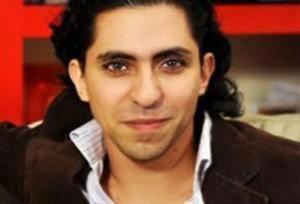The International Humanist and Ethical Union (IHEU) has spoken today at the 26th session of the Human Rights Council on how many states limit free expression by citing “insult” to ideas or general “offence” to beliefs or believers.

Raif Badawi, jailed for 10 years in Saudi Arabia for running a website advocating greater freedoms
Used to silence commentary and reporting on the internet, such repressive measures are rights violations against online journalists, and also a violation of the right to seek and receive information for everyone in the wider society.
Citing recent cases, both of which involve 10 years prison terms — for Saudi blogger Raif Badawi as well as Kuwaiti blogger Hamad al-Naqi — IHEU’s head of delegation to Geneva Elizabeth O’Casey spelled out how restrictions in these and other countries fail to operate within the limits set out under international law. Her full statement follows below:
ORAL STATEMENT
United Nations Human Rights Council, 26th Session (10th – 27th June 2014)
Panel Discussion on the Safety of Journalists
Elizabeth O’Casey, Head of IHEU’S Delegation to the UNHRCThe use of ‘offence’ in silencing online journalists
An attack on a journalist does not only violate that individual’s right to free expression; it violates the rights of others to seek and receive information, it violates a society’s potential and capacity for progress, and it violates one of the core foundations underpinning a transparent and free society.
Free expression, the central tool of journalists, can be undermined by many mechanisms. One that still holds traction, pernicious in its stealthy capacity to silence, is the use of the subjective and mutable notions of ‘offense’ and ‘insult’. Forgetting that respect comes in the form of treating other people’s views as those of autonomous agents and worthy of consideration and questioning, these notions have, in recent times, been used to shut down free expression of online journalists and bloggers, particularly.
For example, a Kuwaiti blogger saw his 10-year prison sentence for insulting the Prophet Mohammed and the kings of Saudi Arabia and Bahrain upheld[1], and a Saudi online editor was sentenced to 10 years in prison on the grounds that he insulted Islam[2].
Not only do these charges violate the rights of the individuals in question, as enshrined by Article 19 of the ICCPR[3], they inculcate a corrupted societal understanding of the notion of free expression and consequently, a fearful climate for journalists to work in.
We commend resolution 21/12 and initiatives by the Council to increase awareness about the need to ensure the safety of journalists, but argue that their safety can never be guaranteed so long as some states maintain an inherent disdain for free expression. Accordingly, we suggest it is made clear to signatory state parties that the limitations to online expression must conform to the criteria listed in article 19 (paragraph 3) of the ICCPR – limitations, which do not include offence taken or the insulting of ideas.
[Notes]
[1] http://www.hrw.org/news/2013/10/29/kuwait-10-years-twitter-comments
[2] http://www.bbc.com/news/world-middle-east-27318400
[3] http://www.ohchr.org/en/professionalinterest/pages/ccpr.aspx